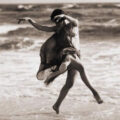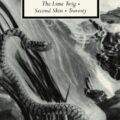Anthems for Bored Youth: On Lars Iyer’s Nietzsche and the Burbs

In an 1886 addendum to The Birth of Tragedy, his first book, German philosopher Friedrich Nietzsche wrote, “today I find it an impossible book—badly written, clumsy, and embarrassing.” The book, originally published when the writer was only twenty-seven, deals with the history of tragedy, from ancient Greece through the music of Richard Wagner, focused specifically on the presence of two concepts, the Apolline and the Dionysiac. He equates these with “the separate art worlds of dream and intoxication.” At the risk of losing the uninitiated, let me dive deeper into these concepts for a moment. Like Schopenhauer, Nietzsche viewed ordinary life as an illusion—experience coming to us “parcelled up, especially including our awareness of ourselves” in Michael Tanner’s words in the notes to the Penguin Classics edition—which means that Apolline art, “the illusion of illusion,” is two-steps removed from true, undifferentiated reality. In contrast, Dionysiac art transcends the Apolline in its unvarnished, objective view: “the image that now reveals to him his unity with the heart of the world is a dream scene symbolizing the primal contradiction and primal suffering, as well as the primal delight in illusion. The ‘I’ of the lyric poet therefore sounds from the very depths of being; his ‘subjectivity’ in the sense used by modern aestheticians is falsehood.” The Dionsyiac work is therefore able to see reality as it truly is, not merely the dream or illusion of life. One may create Apolline art without achieving the heights of the Dionysiac, but the Dionysiac cannot exist without the baseline presence of the Apolline.
Why bother mentioning all of this? Because Lars Iyer—author of the Spurious trilogy, Wittgenstein Jr, and two monographs on Maurice Blanchot—has made use of these concepts in his latest novel, Nietzsche and the Burbs. The novel concerns a group of disaffected high school students who become obsessed with their school’s newest pupil, referred to only as “Nietzsche.” The new kid has NIHILISM scrawled across his notebook and maintains a blog at Last-philosopher.com with the tagline The Uselessness of Everything. “Nietzsche” announces the reason for his url by writing, “I am called the last philosopher because I am the last man. No one speaks to me except me myself, and my voice reaches me like that of a dying man.” The last man, as explained in Thus Spoke Zarathustra, is the polar opposite of the superior man, the Übermensch. The last man searches for security and comfort and remains passive in the face of the Übermensch’s arrival.
Like the majority of those in Zarathustra, Iyer’s characters exist in this kind of relative comfort in Wokingham, a suburb less than an hour from London. But all is not well, as Chandra, the narrator, explains when he considers the future he and his classmates are being groomed for: “They’re preparing us for the outside world—we know that. They’re readying us for office cubicles. They’re measuring us up for our customer-service headsets. Customer service, if we’re lucky. Selling insurance, if we’re lucky. Telemarketing, if we’re lucky. There won’t be much work by the time we’ve finished our studies.” These are common enough complaints from high schoolers—my own crowd had their own version in the early 1990s. Unlike those who abandon themselves to drugs and alcohol, video games and binge-watching, however, Chandra believes that “All adolescents are philosophers. And all philosophers are adolescents at heart.” The adolescent impulse seems to be what Nietzsche rejects in “Attempt at Self-Criticism” when he calls The Birth of Tragedy “a youthful work, full of youthful courage and youthful melancholy.”
Chandra and his friends Art, Merv, and Paula attempt to transcend the ordinary adolescent funk in their unwavering dedication to pessimism. But even they meets their match in “Nietzsche”:
That’s nihilism, right? Art says, turning to Nietzsche. —Not wanting to believe in the world?
Nietzsche: When life turns against life—that’s nihilism.
But why does life turn against life? Merv asks.
Nietzsche: Because we see meaninglessness everywhere.
This is typical of the conversations the group has with their new friend. They ask questions, “Nietzsche” responds, and they aim to absorb his ideas into their versions of ordinary subjective experience. While the characters do “see meaninglessness everywhere,” this does not keep them from entertaining readers.
Two pages after the above conversation, as the quartet discusses their encounters with “Nietzsche,” Art declares, “He might be the leader we always wanted.” Chandra responds, “Nietzsche looks too depressed to lead us,” and Paula adds, “I’m too depressed to be led” (17). Here, as in many other places, Iyer follows the comedy writer’s “rule of three,” upping the ante with each comment. Paula, the most sardonic of the group, often makes the last quip.
This band of malcontents seeks authenticity— “Transfiguration. Dionysus,” in “Nietzsche’s” words—through their experiences in an actual band. Even this goes awry. Paula diagnoses what ails the group when she says, “We can play anything we like. All this freedom, and we don’t know what to do with it.” By this point, they’ve copied Bob Marley and The Heptones and criticized fellow school mates for performing classic rock covers or playing in trendy synth bands. Art, the group’s Brian Eno, is unable to play an instrument, but this doesn’t stop him from pontificating at length about what the band should play: “We’ve got to do something real, Art says. Something serious. These are serious times, man. Doom metal’s serious. Tantric metal’s serious.”
While Art probably has the most lines in the novel, he is also the most impressionable. He thinks he’s a nihilist; he thinks he’s into tantra; he thinks he’s a Gnostic; he thinks he’s a musical visionary capable of flying by the nets of conventional society. His enthusiasm for each of these leads to passionate monologues intended to cow any opposition.
The band doesn’t come together until “Nietzsche” joins as lead vocalist, though he doesn’t actually sing: he talks, half-talks, whispers, chants, and murmurs. Most of all, he improvises lyrics such as, “I no longer understand / the most ordinary things / I’ve forgotten / how to count” and “I open my eyes / in the shadows. / All I do / is lose my way.” Only Chandra realizes the truth: “We’re blind. We’re wanderers in the dark. And Nietzsche, blind, too—only he’s a little less blind than we are. Nietzsche, wandering with us—only slightly ahead of us, leading us….” Hence, the band’s name: Nietzsche and the Burbs.
“Nietzsche” is no more the leader Art seeks than any of them are. As Chandra acknowledges, “Nietzsche” is merely one step farther along the path they trod, if only in his ability to espouse the philosophy of his namesake.
It’s easy to be the smartest person in the room when one is surrounded by dimwits and sycophants, and this is one of the novel’s great challenges. “Nietzsche” is often questioned by teachers and other adults and prodded on to greater heights by the Burbs, but he rarely faces an obstacle that is equal to his rhetoric. The school year builds toward several climaxes, one of which is “Nietzsche’s” project on the vacuity of the suburbs, a common enough topic for a disaffected teenager. But even his teacher, Mr. Varga, falls under his sway, offering naïve encouragement rather than serious objections: “But why should nihilism have become visible here, now—in the suburbs?, Mr Varga asks. In postwar Paris, yes. In Dostoevsky’s St. Petersburg, perhaps….”
“Nietzsche” falls back on obvious critiques such as, “No one expects anything to happen. These are just suburbs with ‘urbs, without a city, without a centre. There’s only the sheer positivity of the suburbs in their infinite sprawl. Their sheer obviousness.” Varga, who Chandra previously admired for his intelligence, is impressed by the teen nihilist: “I think I understand: this is a way of talking about the end of history, Mr Varga says. The end of ideologies. The triumph of liberal capitalism and the last man….” But “Nietzsche” does not stop there. Like an inexperienced driver at the wheel of a sports car, he can’t help himself. He continues revving his intellectual engine, lecturing his teacher—his fellow students are largely forgotten by this point—until Varga is left speechless at the end of an almost page-long account of “Nietzsche’s” turn to nihilism. It’s understandable that these teenagers would dismiss the adults around them, but the fact that Iyer allows them to do so un-ironically weakens the book.
Interestingly, the only thing that does push back successfully against the meaninglessness espoused by “Nietzsche” is love. Like the real Nietzsche, the last philosopher falls for a young woman named Lou. During a drug trip with the Burbs and assorted other friends, “Nietzsche” wanders off into the woods with Lou, after which Chandra, ever the devotee, exclaims, “Nietzsche’s in the throes of a Great Love. He’s more refined than we are. He’s capable of Emotional Depths….” He envisions them “walking ahead of us in the woods. Nietzsche and Lou, above us in the woods. Higher than us. Translated into light. Astral-bodied, ether-bodied, having left the world behind.” But “Nietzsche” isn’t the only one who finds love, even if it isn’t as lofty as Chandra makes the young philosopher’s out to be. Merv finally commits to Bill, with whom he forms a popular disco band, and Chandra succumbs to Noelle’s oft-expressed desire. In a reversal that comes close to driving “Nietzsche” to madness, Lou leaves him for Paula, as the actual Lou left the German philosopher for another man.
Like Paula, Noelle provides a needed break from the gloom and doom and pontificating of the male characters. She chides Art for not recognizing his “privileged” existence in Wokingham, declaring that “most people live in Hell compared to this.” Art is undeterred, but so is Noelle: “I’ve got you guys diagnosed, Noelle says. It’s all about imaginary revenge. You want Wokingham destroyed because it doesn’t recognise your genius, or whatever. You just want a pathetic kind of payback for your comprehensive school lives.” At last, a character who speaks the truth. “Nietzsche” and the others can cloak their discontent in whatever philosophy they want, but Noelle is unimpressed. For good or ill, the odds are that they will age out of this phase, just as Paula believes she has once she finds Lou: “I know my own goodness…. I feel better—like I’ve recovered after some long illness….” She has rejected “Nietzsche’s” appeal as his namesake dismissed The Birth of Tragedy.
Readers unfamiliar with, or even uninterested in, Nietzsche should not be put off by Iyer’s book. Through five works of fiction, he has investigated so much more than the philosophical underpinnings of his oeuvre. Nietzsche and the Burbs, in particular, broadens his critique of education to include the vacuity of a high school experience that does so little to provide guidance that students must look to one of their own for direction. That this direction comes in the form of a nihilistic belief in the meaninglessness of their existence should come as no surprise, within Iyer’s world. Whether writing about the shift from educator to “learning facilitator” for the “Microsoft philosophy package,” as Iyer did in his scathing critique of higher education in Exodus, or the “new don [who] has sold his soul,” as in Wittgenstein Jr, Iyer cautions what will happen if society continues along its current path.
“Nietzsche” is conspicuously absent by the end of the novel, having suffered yet another nervous breakdown. After a disastrous debut performance, the Burbs try to regroup only to find that
We haven’t got a leader, Art says. And we haven’t got a band. We’re just the Burbs. And the Burbs are nothing….
Now you can be your own men, Noelle says.
We don’t want to be our own men, I say.
The group that had been so independent initially, so set on opposing the status quo, finds themselves lost without “Nietzsche.” This doesn’t last long. The leaderless become their own leaders, deciding that “This is the summer when we’ll all go mad” and, conversely, “We’ll be steeling ourselves. Hardening ourselves.” After the latter comment, Art recites the actual Nietzsche from memory, this time from The Joyful Wisdom. Notably, the chapter he quotes from begins “What our Cheerfulness Signifies.” By the end of Nietzsche and the Burbs, the group has moved past the gloomy nihilism of their former leader and begun to forge a new path, one that may end in failure, as Paula assures them it will, but that offers another attempt at transcending their circumstances. Readers may find this too easy a conclusion—why can’t they grow up and accept the illusion of life, the Apolline, for what it is?—but the ‘burbs may never be the same.
About Matthew Duffus
Matthew Duffus is the author of the novel Swapping Purples for Yellows and the poetry chapbook Problems of the Soul and Otherwise. His collection Dunbar's Folly and Other Stories is forthcoming in October 2020.





